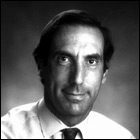|
|
 |
|
Henry Masur, M.D.
Because AIDS is a syndrome
of opportunistic infections and other diseases brought about by a failing
immune system, researchers have been drawn to AIDS from many disciplines.
Dr. Henry Masur became interested in AIDS as an expert in Pneumocystis
carinii, a rare cause of bacterial pneumonia usually seen only in
patients with severe immune disorders. He was on the faculty at Cornell
University in 1979 when a patient with Pneumocystis pneumonia
came into the emergency room. “It was clear to me, because I knew
the literature very well, that it was very unusual for someone to walk
in, previously healthy, with Pneumocystis.” As several
more cases, including men and women, appeared in the New York area, it
became increasingly evident that a new disease was occurring.
Dr. Masur did not know it at the time, but he was among the first physicians
to see a patient with AIDS. As the strange increase in P. carinii
pneumonia began to appear in multiple parts of the country, Dr. Masur
moved to the NIH where he remembers an environment ideally suited for
tackling a complex emerging disease like AIDS. “We could get a lot
of people who were free to choose their own interests,” he recalls,
adding, “One of the real virtues of the NIH community is that there’s
an expert on almost everything here.”
As Dr. Masur describes his involvement in AIDS research, he stresses the
key contributions made by physician-investigators, individuals on the
front lines who care for patients while drawing from basic research, links
that often lead to new treatments. Without these scientists, Dr. Masur
believes, AIDS might not have received such early research attention.
“It looked like it was going to be a problem for them to take care
of patients clinically,” he says, “so they went to the laboratory
and came up with some of the initial answers.”
Dr. Masur is currently chief of the critical care medicine department
at the NIH Clinical Center. He is a leading clinical researcher who continues
to study better ways to treat HIV disease and its associated opportunistic
infections.
Back To Top | Photography
Credits
|
|
 |
| Henry Masur, M.D. |
|
 |

